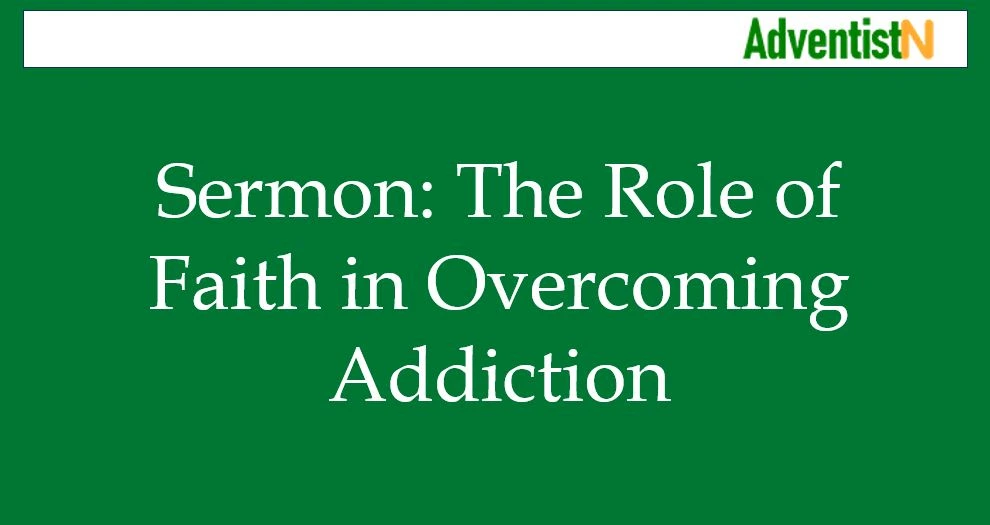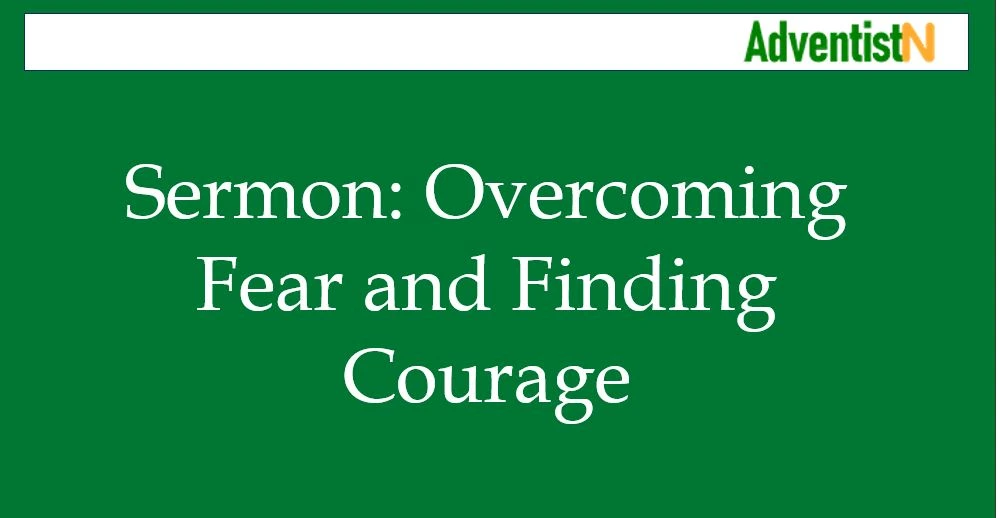
by Onovae Akpoesiri | Aug 20, 2023 | Sermon
Introduction
Today, we gather to discuss a topic that affects countless lives: addiction. This is a struggle that transcends age, background, and circumstances, leaving many feeling trapped and hopeless. But in the midst of darkness, we have a source of light and strength that can guide us through even the most challenging journeys: faith. Together, let’s explore how faith plays a pivotal role in overcoming addiction, drawing wisdom and inspiration from the timeless words of the Bible.
The Nature of Addiction: A Battle for the Soul
Addiction is a formidable adversary that can impact every facet of our being. It’s not just about substances or behaviors; it’s about the battle for our souls and the disruption it brings to our relationships, our purpose, and our connection to God.
Finding Strength in Faith
- Trusting in God’s Power: The Apostle Paul, in Philippians 4:13 (NIV), reminds us that “I can do all this through him who gives me strength.” With faith, we tap into a source of power greater than ourselves – the power of God – to overcome even the most stubborn addictions.
- Seeking Refuge in God: Psalm 46:1 (NIV) brings us comfort with the words, “God is our refuge and strength, an ever-present help in trouble.” When addiction overwhelms us, we can find refuge in the arms of our Heavenly Father, who is always there to offer solace and guidance.
Breaking the Chains of Addiction
- Renewal of Mind: In Romans 12:2 (NIV), we are encouraged not to conform to the patterns of this world, but to be transformed by the renewing of our minds. Faith-driven transformation involves renewing our minds through God’s word, breaking free from the chains of addiction that have kept us captive.
- Resisting Temptation: James 4:7 (NIV) implores us to submit ourselves to God and resist the devil. Through faith, we gain the strength to say “no” to the temptations that have ensnared us, as we draw our strength from the Almighty.
Community and Accountability
- Support from Fellow Believers: The wisdom of Ecclesiastes 4:9-10 (NIV) reminds us of the power of community: “Two are better than one… If either of them falls down, one can help the other up.” Within our faith community, we find support, understanding, and encouragement as we journey toward freedom from addiction.
- Confession and Healing: James 5:16 (NIV) teaches us, “Therefore confess your sins to each other and pray for each other so that you may be healed.” Through the support of our fellow believers, we can openly share our struggles, receive healing, and move toward a life of wholeness.
Walking in the Light of Faith
- Stepping Out of Darkness: In 1 Peter 2:9 (NIV), we are reminded of our chosen identity: “But you are a chosen people, a royal priesthood, a holy nation, God’s special possession.” Through faith, we can step out of the darkness of addiction and into the marvelous light of God’s grace.
- Embracing God’s Plan: Jeremiah 29:11 (NIV) assures us of God’s plans for our lives: “‘For I know the plans I have for you,’ declares the Lord, ‘plans to prosper you and not to harm you, plans to give you hope and a future.'” Through faith, we trust that God’s plan for us extends beyond our struggles, offering hope, healing, and a renewed sense of purpose.
Conclusion: Faith as the Guiding Light
In the midst of addiction’s storm, faith stands as an unwavering anchor. Our faith is a source of strength that helps us face our struggles with courage, hope, and determination. It connects us to a higher power and provides us with the tools to overcome even the most formidable challenges. As we lean on our faith and support one another, we can break free from addiction’s grip and step into a life filled with freedom, joy, and purpose. Let us lift up those who are battling addiction in our prayers, and let us seek God’s wisdom and guidance on our collective journey toward recovery, transformation, and a life of lasting fulfillment. May our faith be the guiding light that leads us from darkness into His marvelous light. Amen.
The Role of Faith in Overcoming Addiction
Read Also- Sermon: Cultivating a Heart of Gratitude

by Onovae Akpoesiri | Aug 17, 2023 | Sermon
Generosity is a virtue that holds a special place in the hearts of many, transcending cultures and religions. In Christianity, the act of giving is deeply rooted in the teachings of Jesus Christ, who exemplified selflessness, compassion, and the joy of sharing with others. This blog post will delve into the transformative power of generosity, its impact on both the giver and the receiver, and how biblical principles encourage us to cultivate a giving spirit that leads to a more fulfilling and compassionate life.
Biblical Perspective on Giving:
Acts 20:35 (NIV): “In everything I did, I showed you that by this kind of hard work we must help the weak, remembering the words the Lord Jesus himself said: ‘It is more blessed to give than to receive.'”
Proverbs 11:24-25 (NIV): “One person gives freely, yet gains even more; another withholds unduly, but comes to poverty. A generous person will prosper; whoever refreshes others will be refreshed.”
2 Corinthians 9:7 (NIV): “Each of you should give what you have decided in your heart to give, not reluctantly or under compulsion, for God loves a cheerful giver.”
The Transformative Power of Generosity:
Joyful Release of Attachment: Jesus’ teachings often emphasized detaching from material possessions and focusing on the spiritual treasures that come from a generous heart.
Strengthening Relationships: Generosity fosters stronger connections with others, as it reflects Christ’s love and compassion in action.
Aligning with Christ’s Example: Christ’s ultimate act of generosity was sacrificing himself for the salvation of humanity, showcasing the epitome of selflessness.
The Giver’s Blessing:
Proverbs 22:9 (NIV): “The generous will themselves be blessed, for they share their food with the poor.”
Luke 6:38 (NIV): “Give, and it will be given to you. A good measure, pressed down, shaken together and running over, will be poured into your lap. For with the measure you use, it will be measured to you.”
Generosity’s Impact on Health and Well-being:
Proverbs 17:22 (NIV): “A cheerful heart is good medicine, but a crushed spirit dries up the bones.”
1 Timothy 6:18-19 (NIV): “Command them to do good, to be rich in good deeds, and to be generous and willing to share. In this way, they will lay up treasure for themselves as a firm foundation for the coming age, so that they may take hold of the life that is truly life.”
The Joyful Ripple Effect:
Emotional Well-being: Studies show that acts of generosity trigger the release of feel-good neurotransmitters in the brain, such as dopamine and oxytocin, leading to a sense of happiness and fulfillment.
Reduced Stress: Engaging in acts of kindness has been linked to reduced stress levels and a sense of calm, as focusing on the needs of others can help shift the focus away from personal worries.
Enhanced Relationships: Giving strengthens interpersonal relationships, fostering trust and emotional bonds that extend beyond the act itself.
Cultivating a Giving Spirit:
Matthew 6:3-4 (NIV): “But when you give to the needy, do not let your left hand know what your right hand is doing, so that your giving may be in secret. Then your Father, who sees what is done in secret, will reward you.”
1 John 3:17 (NIV): “If anyone has material possessions and sees a brother or sister in need but has no pity on them, how can the love of God be in that person?”
Generosity as a Spiritual Discipline:
2 Corinthians 9:11 (NIV): “You will be enriched in every way so that you can be generous on every occasion, and through us your generosity will result in thanksgiving to God.”
Hebrews 13:16 (NIV): “And do not forget to do good and to share with others, for with such sacrifices God is pleased.”
Conclusion:
The joy of giving is a divine gift that aligns us with the heart of God and the teachings of Jesus Christ. As we embrace the transformative power of generosity, we reflect Christ’s love, compassion, and selflessness. The Bible is replete with verses that encourage us to give with joy, share with others, and place our trust in God’s abundance.
As we cultivate a giving spirit, we not only impact the lives of those we help but also experience a profound sense of fulfillment and contentment. Let us heed the wisdom of Scripture, embrace the joy of giving, and follow in the footsteps of the ultimate Giver – Jesus Christ – who bestowed upon us the most selfless and transformative gift of all: salvation.
Read Also- Sermon: Cultivating a Heart of Gratitude

by Onovae Akpoesiri | Aug 15, 2023 | Sermon
Introduction:
Good morning/afternoon, beloved congregation. Today, we gather to explore a topic that resonates with each of us – finding purpose in times of adversity. Life’s challenges, trials, and setbacks can often leave us questioning our path and purpose. But it is during these moments that God’s wisdom and grace guide us towards a greater understanding of His divine plan for our lives.
Bible References:
- Romans 8:28 (NIV)
“And we know that in all things God works for the good of those who love him, who have been called according to his purpose.” - Jeremiah 29:11 (NIV)
“For I know the plans I have for you, declares the Lord, plans for welfare and not for evil, to give you a future and a hope.” - James 1:2-4 (NIV)
“Consider it pure joy, my brothers and sisters, whenever you face trials of many kinds, because you know that the testing of your faith produces perseverance. Let perseverance finish its work so that you may be mature and complete, not lacking anything.”
Understanding Adversity:
Adversity, though challenging, is an inevitable part of life. Whether it’s physical, emotional, or spiritual, adversity shapes us and molds us into who we are meant to become. It’s important to remember that God’s plan for us isn’t exempt from hardship; rather, it is through adversity that we can draw closer to His purpose for our lives.
God’s Sovereign Purpose:
In Romans 8:28, we are reminded that God works all things – even the trials – for the good of those who love Him. The adversities we face are not random, but carefully orchestrated by a loving God who has a purpose for each season of our lives.
Trusting God’s Plans:
Jeremiah 29:11 reassures us that God’s plans for us are filled with hope and a prosperous future. While adversity may cause us to doubt, this verse encourages us to trust that God’s purposes will prevail even in the midst of uncertainty.
Perseverance and Maturity:
James 1:2-4 reminds us that trials produce perseverance, which in turn leads to maturity and completeness. Adversity isn’t meant to break us; it’s meant to refine us, making us stronger and more aligned with God’s purpose.
Joseph’s Journey:
The story of Joseph in the book of Genesis illustrates how adversity can lead to purpose. Despite facing betrayal, slavery, and imprisonment, Joseph’s unwavering faith led him to a position of influence where he saved his family and an entire nation from famine.
Paul’s Perspective:
The Apostle Paul faced numerous adversities, yet he found purpose in spreading the gospel. In Philippians 1:12-14, he shares that his imprisonment actually advanced the gospel, revealing that even in dire circumstances, God’s purpose can be fulfilled.
Finding Purpose in Adversity:
- Seek God’s Guidance: Turn to prayer and seek God’s wisdom during challenging times.
- Anchor in Scripture: Find comfort and guidance in God’s Word, which offers hope and encouragement.
- Embrace Growth: Recognize that adversity refines your character and strengthens your faith.
- Serve Others: Use your experiences to empathize and support others facing similar struggles.
- Persevere in Faith: Trust that God’s sovereign purpose will prevail, even in the face of adversity.
Conclusion:
In closing, adversity is not an obstacle to God’s plan but an integral part of it. Just as precious metals are refined through fire, we are refined through trials, shaping us into vessels capable of fulfilling God’s purpose for our lives. Let us find solace in the knowledge that God is with us in every storm, guiding us towards the purpose He has ordained for us.
May we emerge from adversity with a deeper understanding of His sovereignty and a strengthened commitment to fulfilling His divine plan. Amen.
Finding Purpose in Times of Adversity
Read Also – Sermon: Finding Hope in Difficult Times

by Onovae Akpoesiri | Aug 14, 2023 | Sermon
Introduction:
Good morning/afternoon, dear congregation. Today, we gather to address a universal human experience – fear. Fear has the potential to paralyze us, hinder our growth, and separate us from God’s purpose for our lives. But, in His Word, we find countless stories of overcoming fear with unwavering courage. Our exploration today will focus on the biblical examples of individuals who conquered fear and discovered the transformative power of courage.
Bible References:
- Joshua 1:9 (NIV)
“Have I not commanded you? Be strong and courageous. Do not be afraid; do not be discouraged, for the Lord your God will be with you wherever you go.” - Psalm 27:1 (NIV)
“The Lord is my light and my salvation—whom shall I fear? The Lord is the stronghold of my life—of whom shall I be afraid?” - Isaiah 41:10 (NIV)
“So do not fear, for I am with you; do not be dismayed, for I am your God. I will strengthen you and help you; I will uphold you with my righteous right hand.”
Overcoming Fear:
The Bible often reminds us that fear is not from God. Instead, He calls us to embrace courage, knowing that He is always with us. Joshua’s story is a testament to this truth. Despite facing the unknown, God’s promise to be with him instilled the courage he needed to lead the Israelites into the Promised Land.
Finding Courage in God’s Presence:
In Psalm 27:1, David asserts that God’s presence dispels fear. Knowing that the Lord is our stronghold and salvation empowers us to face challenges with unwavering courage.
God’s Promises: Our Foundation:
God’s promises are an anchor for our courage. In Isaiah 41:10, He reassures us that His strength will support us, no matter the circumstances. This assurance enables us to overcome fear and find courage in His faithfulness.
Transformed by Faith:
Biblical figures like Esther, who risked her life to save her people, and Peter, who stepped out of the boat to walk on water, exemplify courage born out of faith. When we place our trust in God, fear loses its grip on us.
Courage in the Face of Uncertainty:
Abraham’s journey of faith is a reminder that God’s plans may not always be clear, but His faithfulness remains steadfast. Abraham’s courage to leave his homeland stemmed from his trust in God’s guidance.
Practical Steps to Finding Courage:
- Prayer and Meditation: Seek God’s presence through prayer and meditation on His Word to find courage.
- Community: Surround yourself with supportive Christian friends who uplift and encourage you.
- Stepping Out: Embrace challenges with the knowledge that God’s strength is perfected in our weaknesses.
- Remembering God’s Promises: Hold onto the promises found in Scripture during moments of fear.
Conclusion:
As followers of Christ, we’re called to live lives of courage, overcoming fear through our faith in Him. Just as Joshua, David, Esther, and Abraham found courage in God’s presence and promises, we too can triumph over fear. May we continuously seek refuge in the Word, draw strength from God’s promises, and step into the unknown with unwavering faith. Let us remember that we serve a God who walks beside us, dispelling fear and igniting courage as we navigate life’s journey. Amen.
Sermon: Cultivating a Heart of Gratitude

by Onovae Akpoesiri | Aug 14, 2023 | Sermon
Introduction:
Good morning/afternoon, dear congregation. Today, we gather to delve into a fundamental aspect of our faith – the call to love one another through actions of service and compassion. Our discussion today is centered on the idea that love is not merely a sentiment; it’s a powerful force that drives us to serve and uplift those around us.
Bible Reference: 1 John 3:16-18 (NIV)
“This is how we know what love is: Jesus Christ laid down his life for us. And we ought to lay down our lives for our brothers and sisters. If anyone has material possessions and sees a brother or sister in need but has no pity on them, how can the love of God be in that person? Dear children, let us not love with words or speech but with actions and in truth.”
Love in Action:
The words of 1 John 3:16-18 remind us that the highest form of love is sacrificial – just as Jesus demonstrated by laying down His life for us. This love isn’t passive; it’s active, compelling us to serve those around us selflessly. It’s easy to speak of love, but our faith calls us to tangibly demonstrate it through our actions.
Compassion in Service:
Compassion is at the heart of Christian service. It goes beyond empathy; it drives us to act on behalf of others. It’s not limited to the deserving; rather, it reaches out to all, regardless of circumstances. Jesus Himself exemplified compassion in His interactions with the sick, the outcast, and the marginalized.
The Impact of Loving Service:
When we serve others with compassion, we have the power to transform lives. Our acts of love can mend broken spirits, alleviate suffering, and restore hope. Every meal shared with the hungry, every hand extended to the hurting, and every act of kindness offered in the name of Christ has the potential to leave a lasting impact.
Breaking Down Barriers:
Loving service also breaks down barriers that divide us. When we serve, we look beyond differences and see the inherent worth in every individual. Our service becomes a bridge that connects hearts and fosters unity within our communities.
Overcoming Self-Centeredness:
Serving others with compassion challenges our self-centered tendencies. It reminds us that the purpose of life isn’t merely to fulfill our own desires, but to make a positive difference in the lives of those around us. This shift in perspective aligns us more closely with Christ’s teachings.
Practical Ways to Serve:
- Volunteerism: Dedicate your time and skills to local charities, shelters, or community organizations.
- Acts of Kindness: Perform small acts of kindness – holding doors, offering help, or simply lending a listening ear.
- Supporting the Needy: Contribute to food drives, clothing donations, and initiatives that aid the less fortunate.
- Visiting the Lonely: Spend time with the elderly, sick, or isolated members of our community.
- Mentoring: Guide and mentor young individuals seeking guidance and direction in their lives.
Conclusion:
In closing, as followers of Christ, let us internalize the message of 1 John 3:16-18. Love in action is a true reflection of our faith – it’s the embodiment of Christ’s love within us. May we find inspiration in His example and commit ourselves to serving others with compassion, for it is through these acts that we shine His light and make His love evident in a world yearning for genuine care and kindness. Let us move forward, not just loving in words, but in deeds and in truth. Amen.
Sermon: Cultivating a Heart of Gratitude

by Onovae Akpoesiri | Aug 13, 2023 | Sermon
Introduction
Greetings, beloved congregation. Today, we gather to explore a topic of profound significance – the power of forgiveness. Forgiveness is a concept deeply embedded in the teachings of our faith, and it holds the potential to transform lives, heal wounds, and reconcile relationships. As we delve into the Scriptures and reflect on the divine example of forgiveness, we will uncover the transformative power it carries and how it aligns with the core principles of our Christian faith.
Understanding Forgiveness: A Biblical Perspective
To truly grasp the depth of forgiveness, we turn to the pages of the Bible, where forgiveness is a central theme. In Colossians 3:13, the Apostle Paul writes, “Bear with each other and forgive one another if any of you has a grievance against someone. Forgive as the Lord forgave you.” Here, forgiveness is not just a suggestion; it’s a command rooted in the example of our Lord.
The Divine Model of Forgiveness
At the heart of forgiveness is the divine model set forth by Jesus Christ himself. In Luke 23:34, as Jesus hung on the cross, enduring immense suffering, he uttered these words: “Father, forgive them, for they do not know what they are doing.” This moment encapsulates the epitome of forgiveness – extending grace even in the face of betrayal, pain, and injustice. Jesus, the embodiment of divine love and mercy, showed us that forgiveness is not about condoning wrongs but about offering a path to redemption and healing.
The Transformative Power of Forgiveness
- Healing Hearts: Forgiveness possesses the remarkable power to heal wounded hearts. When we carry the weight of anger and resentment, it harms our emotional and spiritual well-being. By choosing to forgive, we release these burdens and invite healing into our lives.
- Restoring Relationships: Forgiveness is a bridge to restored relationships. Matthew 5:23-24 reminds us that before presenting our offerings to God, we should first be reconciled with our brother or sister. Forgiveness paves the way for reconciliation, fostering unity and love.
- Breaking Chains of Negativity: Holding onto grudges perpetuates negativity within our hearts and relationships. Ephesians 4:31-32 urges us to “get rid of all bitterness, rage, and anger.” Forgiveness breaks these chains, liberating us from the cycle of hurt.
- Embracing Redemption: Through forgiveness, we align ourselves with the redemption narrative woven throughout the Bible. Just as God forgives us through the sacrifice of Christ, we are called to forgive others, allowing them the opportunity for transformation and renewal.
Challenges on the Path of Forgiveness
While forgiveness holds immense power, it’s not always an easy journey. Acknowledging the challenges can help us navigate this path:
- Emotional Struggles: Letting go of resentment can be emotionally demanding, especially in the face of deep wounds. However, Psalm 147:3 reminds us that God “heals the brokenhearted and binds up their wounds.”
- Misunderstandings: Forgiveness is often misunderstood as excusing the offense. Remember that forgiveness is about healing, not minimizing the wrongs committed.
- Ego and Pride: Our ego and pride can hinder us from extending forgiveness. Yet, humility, as emphasized in Philippians 2:3, is the foundation for authentic Christian living.
- Fear of Vulnerability: Forgiveness requires vulnerability, which can be intimidating. However, 2 Corinthians 12:9 reminds us that Christ’s power is made perfect in weakness.
Steps Toward Forgiveness
- Recognize the Pain: Begin by acknowledging the pain caused by the offense. Ignoring it delays the healing process.
- Remember God’s Forgiveness: Reflect on God’s forgiveness toward us. Ephesians 4:32 encourages us to forgive others “just as in Christ God forgave you.”
- Prayer and Reflection: Seek God’s guidance through prayer and meditation. Ask for strength to follow the divine example of forgiveness.
- Choose Forgiveness: Forgiveness is a conscious choice, not a feeling. Choose to release negative emotions and open your heart to healing.
- Extend Forgiveness: If possible, communicate your decision to forgive to the person who wronged you. This step can facilitate healing and reconciliation.
Conclusion
As we conclude, remember that forgiveness is not just a human endeavor but a divine command. Through the sacrifice of Jesus Christ, we are offered the ultimate example of forgiveness. By embracing forgiveness, we align ourselves with the redemptive narrative of our faith, allowing grace to transform hearts and relationships.
Let us heed the words of Ephesians 4:31-32: “Get rid of all bitterness, rage, and anger, brawling and slander, along with every form of malice. Be kind and compassionate to one another, forgiving each other, just as in Christ God forgave you.”
May we leave this place inspired to forgive as Christ forgave us, nurturing a spirit of healing, reconciliation, and love. Let us remember that forgiveness is a gift we give not only to others but to ourselves – a gift that echoes the divine grace extended to us.
The Power of Forgiveness
Read Also: Sermon: Finding Hope in Difficult Times






